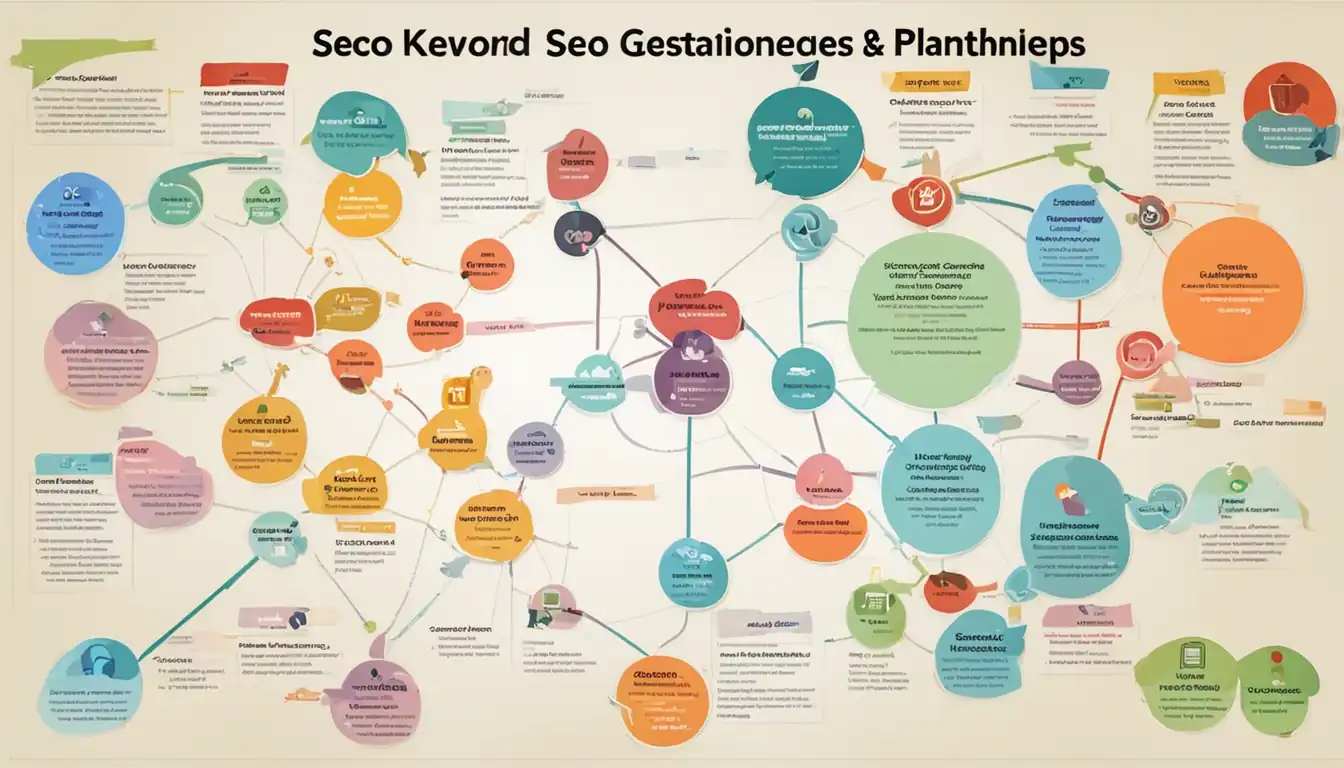Mastering Keyword Strategy for SEO Success

Are you ready to take your SEO game to the next level? Mastering keyword strategy is the key to unlocking success in the competitive world of search engine optimization. By understanding how keywords work, conducting effective research, analyzing your competition, and implementing a strategic plan, you can drive more traffic to your website and increase your online visibility. Let's dive into the world of keyword strategy and discover how you can optimize your content for SEO success.
Understanding Keyword Strategy

The Role of Keywords in SEO
Keywords are the foundation of any successful SEO strategy. They are the words and phrases that users type into search engines when looking for information, products, or services. By strategically incorporating relevant keywords into your website content, you can improve your chances of ranking higher in search engine results pages (SERPs) and driving organic traffic to your site.
How Keyword Strategy Fits into Your Overall SEO Plan
Keyword strategy is a crucial component of your overall SEO plan. It involves researching and selecting the right keywords to target based on factors such as search volume, competition, and relevance to your business. By identifying high-value keywords that align with your goals and target audience, you can create optimized content that attracts more organic traffic and boosts your search engine rankings.
Incorporating keyword strategy into your SEO plan involves:
- Conducting keyword research to identify relevant keywords with high search volume
- Analyzing keyword competition to determine which keywords offer the best opportunities for ranking
- Incorporating targeted keywords into your website content, meta tags, and other on-page elements
- Monitoring keyword performance and making adjustments as needed to improve rankings
By mastering keyword strategy and integrating it seamlessly into your overall SEO plan, you can increase visibility, drive more organic traffic, and ultimately achieve greater success online.
Starting with Keyword Research

Keyword research is the foundation of any successful SEO strategy. By understanding the terms and phrases your target audience is searching for, you can create content that meets their needs and drives organic traffic to your website.
Identifying Your Target Audience
Before diving into keyword research, it's essential to have a clear understanding of your target audience. Consider factors such as demographics, interests, and pain points to tailor your keyword strategy effectively.
Tools and Techniques for Effective Keyword Research
Utilize a combination of tools and techniques to conduct thorough keyword research. Some popular tools include Google Keyword Planner, SEMrush, Ahrefs, and Moz Keyword Explorer. Additionally, consider using techniques like competitor analysis and long-tail keyword research to uncover valuable keywords for your content strategy.
Analyzing the Competition

Competitor analysis is a crucial step in developing a successful keyword strategy for SEO. By understanding what keywords your competitors are targeting and how they are performing, you can gain valuable insights to inform your own strategy.
What You Can Learn from Competitor Keywords
Identify High Performing Keywords: Analyzing competitor keywords can help you identify which keywords are driving the most traffic and conversions for them.
Discover Gaps in Your Strategy: By comparing your keyword list with that of your competitors, you can identify any gaps in your strategy and uncover new keyword opportunities.
Understand Competitor Tactics: Examining the keywords your competitors are targeting can also provide insight into their overall SEO strategy and tactics.
Finding Opportunities in Competitive Analysis
Target Untapped Keywords: Use competitive analysis to find keywords that your competitors may have overlooked or not optimized effectively.
Improve Your Content Strategy: By analyzing competitor keywords, you can refine your content strategy to better target relevant keywords and attract more organic traffic.
Stay Ahead of the Competition: Regularly monitoring and analyzing competitor keywords allows you to stay ahead of the competition and adapt your strategy as needed.
By leveraging competitor analysis to inform your keyword strategy, you can optimize your SEO efforts and improve your chances of success in search engine rankings.
Crafting Your Keyword List

When it comes to SEO success, crafting a strategic keyword list is essential. By targeting the right keywords, you can attract the right audience to your website and improve your search engine rankings. Here are some key strategies for mastering your keyword list:
Balancing Broad and Long-Tail Keywords
- Broad Keywords: These are short, general keywords that have high search volume but also high competition. Examples include "shoes" or "digital marketing."
- Long-Tail Keywords: These are longer, more specific phrases that have lower search volume but also lower competition. Examples include "women's running shoes with arch support" or "best digital marketing strategies for startups."
Balancing both broad and long-tail keywords in your keyword list is crucial. Broad keywords can help attract a larger audience, while long-tail keywords can target a more specific audience that is likely to convert.
Prioritizing Your Keywords for Maximum Impact
- Relevance: Ensure that your chosen keywords are relevant to your content and target audience.
- Search Volume: Consider the search volume of each keyword to determine its potential impact on your SEO efforts.
- Competition: Evaluate the level of competition for each keyword to understand how difficult it will be to rank for them.
- Commercial Intent: Focus on keywords with high commercial intent, as they are more likely to lead to conversions.
Prioritizing your keywords based on relevance, search volume, competition, and commercial intent will help you create a targeted and effective keyword strategy for SEO success.
Implementing Your Keyword Strategy
Implementing a well-thought-out keyword strategy is crucial for achieving SEO success. Here are some key steps to help you master your keyword strategy:
Incorporating Keywords Naturally into Your Content
When it comes to incorporating keywords into your content, it's essential to do so in a natural and seamless way. Here are some tips to help you achieve this:
Keyword Placement: Place your primary keywords in strategic locations such as the title, headings, meta descriptions, and throughout the body of your content.
Keyword Density: Aim for a keyword density of around 1-2% to avoid over-optimization while still signaling to search engines what your content is about.
Variety of Keywords: Use a mix of long-tail and short-tail keywords to capture different search intents and reach a broader audience.
Beyond Text: Optimizing Images and Videos with Keywords
In addition to optimizing your text content, don't forget about images and videos. Here's how you can incorporate keywords into these multimedia elements:
Image Alt Text: Include relevant keywords in the alt text of your images to improve accessibility and provide additional context for search engines.
Video Titles and Descriptions: Use keywords in the titles and descriptions of your videos to make them more discoverable on platforms like YouTube.
By following these strategies for incorporating keywords naturally into your content, you can enhance the visibility of your website and attract more organic traffic.
Monitoring and Adjusting Your Strategy

In the world of SEO, monitoring and adjusting your keyword strategy is crucial for long-term success. By keeping a close eye on your keyword performance and knowing when to make revisions, you can stay ahead of the competition and continue to drive organic traffic to your website.
Tracking Your Keyword Performance
Tracking your keyword performance is essential for understanding how well your current strategy is working. By using tools like Google Analytics or SEMrush, you can monitor key metrics such as search volume, click-through rates, and keyword rankings. This data will give you valuable insights into which keywords are driving traffic to your site and which ones may need to be optimized or replaced.
Key Points:
- Use tools like Google Analytics or SEMrush to track keyword performance.
- Monitor metrics such as search volume, click-through rates, and keyword rankings.
- Analyze data regularly to identify trends and areas for improvement.
When and How to Revise Your Keyword Strategy
Knowing when to revise your keyword strategy is just as important as tracking its performance. If you notice that certain keywords are not performing as well as expected or if there are new trends in your industry that you want to capitalize on, it may be time to make adjustments. This could involve replacing underperforming keywords with more relevant ones, targeting long-tail keywords for specific niches, or optimizing existing content for better visibility.
Key Points:
- Revise your keyword strategy if certain keywords are underperforming.
- Capitalize on new trends in your industry by updating your target keywords.
- Optimize existing content for better visibility in search results.
By staying proactive in monitoring and adjusting your keyword strategy, you can ensure that your SEO efforts continue to yield positive results over time. Remember that SEO is an ongoing process, and staying ahead of the curve will help you maintain a competitive edge in the digital landscape.
Conclusion
In conclusion, mastering keyword strategy is essential for achieving SEO success. By following the steps outlined in this post - from conducting thorough keyword research to monitoring and adjusting your strategy over time - you can improve your search engine rankings and attract more organic traffic to your website. Remember, SEO is an ongoing process, so stay proactive and keep refining your keyword strategy to stay ahead of the competition. Happy optimizing!